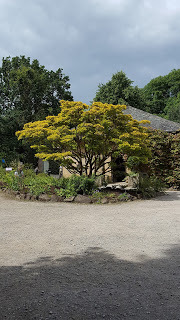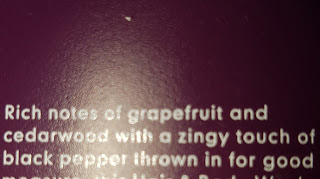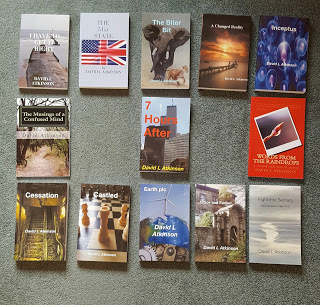David L. Atkinson's Blog, page 5
November 10, 2017
Writing - Semi-det bung.
I read the back of a bottle this week and was surprised to see the claims it was making as to the flavour of its contents. It reminded me of a wine show that I watched years ago when the 'expert' (old drip under pressure), described a white wine as smelling and tasting of petrol and lemons. Well after laughing my socks off I considered my reaction if served such a wine - straight down the sink!
 Semi-det bung.
Semi-det bung.
The above wine debacle set up a chain reaction in my mind that reminded me of an advert for a house sale that created hilarity in the Atkinson household many years ago. It was for a semi-detached bungalow described as a des. (desirable) res. (residence). The advert was in the local newspaper and so had the abbreviations described. To others it may not seem funny but if in a more biological frame of mind consider again.

This product is one that I use daily particularly in the morning but not exclusively so. The clue is really in the cedarwood. This is an upmarket shower gel. Black pepper!!!!

Fairly obviously a washing up liquid but this is one of a range of products that claim to have amazing capabilities in part attributed to having a fruit base. Seriously!
Finally, my favourite for all sorts of reasons.

This is a positive flavour fest with vanilla, caramel, latte, almonds, sun dried raisins, banana cake and maple syrup. The person writing this label indulged in a rich range of adjectives also. The banana cake is 'moist', the caramel 'creamy' and the flavours are 'silky'. A fine, persuasive list of attributes to what is a brand of whisky. I must say that in a decent scotch I can usually manage the vanilla and caramel flavours but the rest require a deal of creative imagining.
The point is that we describe and are subject to, persuasive writings in everyday life. As authors there is rarely a situation where your writing won't be enriched by a little excursion into picturesque language so keep your eyes open as to when and where it is used and enjoy the imagery.
God Bless
 Semi-det bung.
Semi-det bung.
The above wine debacle set up a chain reaction in my mind that reminded me of an advert for a house sale that created hilarity in the Atkinson household many years ago. It was for a semi-detached bungalow described as a des. (desirable) res. (residence). The advert was in the local newspaper and so had the abbreviations described. To others it may not seem funny but if in a more biological frame of mind consider again.

This product is one that I use daily particularly in the morning but not exclusively so. The clue is really in the cedarwood. This is an upmarket shower gel. Black pepper!!!!

Fairly obviously a washing up liquid but this is one of a range of products that claim to have amazing capabilities in part attributed to having a fruit base. Seriously!
Finally, my favourite for all sorts of reasons.

This is a positive flavour fest with vanilla, caramel, latte, almonds, sun dried raisins, banana cake and maple syrup. The person writing this label indulged in a rich range of adjectives also. The banana cake is 'moist', the caramel 'creamy' and the flavours are 'silky'. A fine, persuasive list of attributes to what is a brand of whisky. I must say that in a decent scotch I can usually manage the vanilla and caramel flavours but the rest require a deal of creative imagining.
The point is that we describe and are subject to, persuasive writings in everyday life. As authors there is rarely a situation where your writing won't be enriched by a little excursion into picturesque language so keep your eyes open as to when and where it is used and enjoy the imagery.
God Bless
Published on November 10, 2017 10:33
November 8, 2017
Poetry Thursday 283 - Souvenir
Remembrance Sunday coming up. I have seen 67. Still more wars are fought and the common denominators are power, land, oil, greed and jealousy. Still we don't learn.
[image error]
Remembering
We all must try to recall,soldiers’ lives before they fall,if we are to dodge mistakes,and remember the more it takesto avoid the violence of war,a far from simple chore.
It is important when remembering,that we do so in protectingyoung lives from mindless violence,guarding all of their innocence,so that futures can be constructed,and costs of war avoided.
So now we have remembered,as another year is passed,and hope we’ve stepped towarda lasting peace going forward,never again to greed and anger yield,for England to be part of some foreign field.©David L Atkinson November 2017

Remember feeling
Say what you feel,don’t bottle it up,remember the deal,fill up the cup,with your memories.
Express your feelings,but choose the moment,edit the dealings,mind the content,of your memories.
Feel good in what you share,pleased with your choices,still have a care,against deriding voices,over your memories.©David L Atkinson November 2017
God Bless
[image error]
Remembering
We all must try to recall,soldiers’ lives before they fall,if we are to dodge mistakes,and remember the more it takesto avoid the violence of war,a far from simple chore.
It is important when remembering,that we do so in protectingyoung lives from mindless violence,guarding all of their innocence,so that futures can be constructed,and costs of war avoided.
So now we have remembered,as another year is passed,and hope we’ve stepped towarda lasting peace going forward,never again to greed and anger yield,for England to be part of some foreign field.©David L Atkinson November 2017

Remember feeling
Say what you feel,don’t bottle it up,remember the deal,fill up the cup,with your memories.
Express your feelings,but choose the moment,edit the dealings,mind the content,of your memories.
Feel good in what you share,pleased with your choices,still have a care,against deriding voices,over your memories.©David L Atkinson November 2017
God Bless
Published on November 08, 2017 09:50
November 7, 2017
Writing - George Orwell's raisin d'etre
No better a role model is George Orwell but what were some of the occasions that motivated him?
[image error]
The BBC headquarters in London is getting a new resident: he's tall, bronze and likes a smoke. From Tuesday a statue of novelist George Orwell is to adorn the exterior of New Broadcasting House, a few minutes from where Orwell worked as a radio producer in World War Two. But what was the author of Nineteen Eighty-four (Orwell's original worded title) doing in the BBC? And did he like it? For decades its staff have delighted in the suggestion Orwell took his notion of absolute hell from two years spent at the BBC.
Near the end of Nineteen Eighty-four (1984 is now more commonly used on book covers), Winston Smith finds himself trapped in the Ministry of Love's Room 101, "many metres underground".
He must face the worst thing in the world (which turns out to be a rat). Since the book came out in 1949 some have suggested it was Orwell's comment on a similarly-numbered room at Broadcasting House where he had to tolerate endless dull meetings.
[image error]
The idea appeals to writers trying to make sense of what seems an unlikely part of Orwell's career - his time on the BBC staff from August 1941 to November 1943.
But Orwell didn't even work at Broadcasting House. When, aged 38, he became a Talks Assistant in the Overseas Empire Department and was based in premises the BBC had moved into at 55 Portland Place.
[image error]
The idea appeals to writers trying to make sense of what seems an unlikely part of Orwell's career - his time on the BBC staff from August 1941 to November 1943.
But Orwell didn't even work at Broadcasting House. When, aged 38, he became a Talks Assistant in the Overseas Empire Department and was based in premises the BBC had moved into at 55 Portland Place.
Orwell was already a well-known journalist and novelist. But he wasn't world-famous, as he later became with Animal Farm (in 1945) and with Nineteen Eighty-four.
At the back of the new statue will be a quote from a preface to Animal Farm and is something I'm sure many people, not just writers, often want to say.
"If liberty means anything at all, it means the right to tell people what they do not want to hear."
God Bless
[image error]
The BBC headquarters in London is getting a new resident: he's tall, bronze and likes a smoke. From Tuesday a statue of novelist George Orwell is to adorn the exterior of New Broadcasting House, a few minutes from where Orwell worked as a radio producer in World War Two. But what was the author of Nineteen Eighty-four (Orwell's original worded title) doing in the BBC? And did he like it? For decades its staff have delighted in the suggestion Orwell took his notion of absolute hell from two years spent at the BBC.
Near the end of Nineteen Eighty-four (1984 is now more commonly used on book covers), Winston Smith finds himself trapped in the Ministry of Love's Room 101, "many metres underground".
He must face the worst thing in the world (which turns out to be a rat). Since the book came out in 1949 some have suggested it was Orwell's comment on a similarly-numbered room at Broadcasting House where he had to tolerate endless dull meetings.
[image error]
The idea appeals to writers trying to make sense of what seems an unlikely part of Orwell's career - his time on the BBC staff from August 1941 to November 1943.
But Orwell didn't even work at Broadcasting House. When, aged 38, he became a Talks Assistant in the Overseas Empire Department and was based in premises the BBC had moved into at 55 Portland Place.
[image error]
The idea appeals to writers trying to make sense of what seems an unlikely part of Orwell's career - his time on the BBC staff from August 1941 to November 1943.
But Orwell didn't even work at Broadcasting House. When, aged 38, he became a Talks Assistant in the Overseas Empire Department and was based in premises the BBC had moved into at 55 Portland Place.
Orwell was already a well-known journalist and novelist. But he wasn't world-famous, as he later became with Animal Farm (in 1945) and with Nineteen Eighty-four.
At the back of the new statue will be a quote from a preface to Animal Farm and is something I'm sure many people, not just writers, often want to say.
"If liberty means anything at all, it means the right to tell people what they do not want to hear."
God Bless
Published on November 07, 2017 10:55
November 6, 2017
Tuesday Food Blog - Suet pudding
As a child growing up one of the options for meals included the use of suet, a form of fat (see below). Unlike what is featured today it was mainly used in the production of sweet puddings, chiefly apple or Spotted Dick. You can also use suet in dumplings.
Suet is the raw, hard fat of beef or mutton found around the loins and kidneys. Suet has a melting point of between 45 °C and 50 °C

The filling could be stewed lamb with onions and peas, or something with stewing beef.
For the suet crustbutter, for greasing285g/10oz self-raising flour125g/4½oz suet1 tsp baking powder1 tbsp finely chopped fresh rosemaryMethodWhen you are ready to cook the pudding, first generously butter a 1.2 litre/2 pint pudding basin.To make the pastry, mix the ingredients together thoroughly and season with salt and pepper. Gradually stir in water until you have a soft, slightly sticky dough (you’ll need about 225ml/8fl oz of water).Divide off about a quarter of the dough, to be used for the pastry lid. Dust your work surface with flour and roll out the larger piece of dough into a circle roughly 30cm/12in in diameter. Use this to line the pudding basin, leaving the excess pastry hanging over the edge. Roll out the small piece of dough large enough to form a lid for the basin.Spoon the cooled filling into the pastry-lined basin. Dampen the edges with water and add the pastry lid. Press the edges together to seal and trim away the excess pastry neatly.Place a piece of baking parchment over a sheet of foil and make a large pleat in the middle, folding both sheets together (this allow the pudding to expand as it cooks). Put the parchment and foil on top of the pudding, foil side up, and secure with string, looping the end of the string over the top of the pudding and tying it to form a handle that will enable you to lift the pudding in and out of the saucepan.Place the basin in a large pan, and pour in enough boiling water to come halfway up the side of the basin. Put a lid on the pan and bring to a simmer. Turn the heat low and let the pudding steam for 2-2½ hours. Top up the boiling water during this time if necessary so the pan doesn’t boil dry.Remove the pudding from the pan, take off the foil and parchment and leave to rest for five minutes. Then use a small, sharp knife to release the sides of the pudding from the basin. Put a large plate over the pudding and invert it, so the pudding comes out on to the plate. Serve straight away.God Bless
Suet is the raw, hard fat of beef or mutton found around the loins and kidneys. Suet has a melting point of between 45 °C and 50 °C

The filling could be stewed lamb with onions and peas, or something with stewing beef.
For the suet crustbutter, for greasing285g/10oz self-raising flour125g/4½oz suet1 tsp baking powder1 tbsp finely chopped fresh rosemaryMethodWhen you are ready to cook the pudding, first generously butter a 1.2 litre/2 pint pudding basin.To make the pastry, mix the ingredients together thoroughly and season with salt and pepper. Gradually stir in water until you have a soft, slightly sticky dough (you’ll need about 225ml/8fl oz of water).Divide off about a quarter of the dough, to be used for the pastry lid. Dust your work surface with flour and roll out the larger piece of dough into a circle roughly 30cm/12in in diameter. Use this to line the pudding basin, leaving the excess pastry hanging over the edge. Roll out the small piece of dough large enough to form a lid for the basin.Spoon the cooled filling into the pastry-lined basin. Dampen the edges with water and add the pastry lid. Press the edges together to seal and trim away the excess pastry neatly.Place a piece of baking parchment over a sheet of foil and make a large pleat in the middle, folding both sheets together (this allow the pudding to expand as it cooks). Put the parchment and foil on top of the pudding, foil side up, and secure with string, looping the end of the string over the top of the pudding and tying it to form a handle that will enable you to lift the pudding in and out of the saucepan.Place the basin in a large pan, and pour in enough boiling water to come halfway up the side of the basin. Put a lid on the pan and bring to a simmer. Turn the heat low and let the pudding steam for 2-2½ hours. Top up the boiling water during this time if necessary so the pan doesn’t boil dry.Remove the pudding from the pan, take off the foil and parchment and leave to rest for five minutes. Then use a small, sharp knife to release the sides of the pudding from the basin. Put a large plate over the pudding and invert it, so the pudding comes out on to the plate. Serve straight away.God Bless
Published on November 06, 2017 10:50
November 3, 2017
Writing - Nothing new under the sun
There's nothing new under the sun, or is it that we just haven't found it yet?

There have been human type beings on this earth for around 200 000 years. We are primates and until yesterday there were only 6 types of primates on the planet.
[image error]Tapanuli Orang
Scientists announced yesterday that a 7th primate had been discovered, the Tapanuli Orang-u-Tan, which joins the Sumatran and Borneo species. As there are reckoned to be only around 800 left alive it goes immediately to the endangered species list.
Given the above information one must conclude that there are species that have lived and were never 'discovered' before they became extinct. Civilised man has only been around for 6000 years and as we are constantly discovering new species of dinosaur from fossils and insects that are alive, then we still really don't know this planet that well. In fact if you watch David Attenborough's Blue Planet II that began last Sunday BBC1 at 20:00 there is 2/3rds of the planet that we know very little about.
So when we write our stories, where creatures we include are concerned we can be as freely creative as we want to be. In a sense it is a licence to create without fear of criticism.
It reminded me of Lee Child's comment about writing to entertain not to win awards. David Walliams, TV actor and presenter, has written children's books very successfully and believes that we should write for enjoyment. I couldn't agree more. If I found writing a chore I wouldn't do it. The beauty of it is the more you write the greater your skills develop and so there is that reward also. So you aspiring authors stop aspiring and get writing.
God Bless

There have been human type beings on this earth for around 200 000 years. We are primates and until yesterday there were only 6 types of primates on the planet.
[image error]Tapanuli Orang
Scientists announced yesterday that a 7th primate had been discovered, the Tapanuli Orang-u-Tan, which joins the Sumatran and Borneo species. As there are reckoned to be only around 800 left alive it goes immediately to the endangered species list.
Given the above information one must conclude that there are species that have lived and were never 'discovered' before they became extinct. Civilised man has only been around for 6000 years and as we are constantly discovering new species of dinosaur from fossils and insects that are alive, then we still really don't know this planet that well. In fact if you watch David Attenborough's Blue Planet II that began last Sunday BBC1 at 20:00 there is 2/3rds of the planet that we know very little about.
So when we write our stories, where creatures we include are concerned we can be as freely creative as we want to be. In a sense it is a licence to create without fear of criticism.
It reminded me of Lee Child's comment about writing to entertain not to win awards. David Walliams, TV actor and presenter, has written children's books very successfully and believes that we should write for enjoyment. I couldn't agree more. If I found writing a chore I wouldn't do it. The beauty of it is the more you write the greater your skills develop and so there is that reward also. So you aspiring authors stop aspiring and get writing.
God Bless
Published on November 03, 2017 12:26
November 1, 2017
Poetry Thursday 282 - Forward thinking
The title because there is no point in looking backwards.

No Rewind Button
When we take that first breath,the first step on the track to death,there are no branches or sidings,just one set of rails we’re following.
Different routes become clear,junctions give the choice to veer,but once off on a different track,there is no opportunity to turn back.
All our motion must be forward,we can’t lose our way toward,the ultimate, inevitable cessation,and pulling in at that final station.
If we are to enjoy our journey,making the most of every opportunity,then we must enable changes,be brave, and expand scope of ranges.
Presented then with the choices,to satisfy the drive of inner voices,we choose the most favourable branch,and take the path of least resistance.
Only when close to the final stop,do we understand how our choices prop,the aims throughout life’s expedition,to a happy and satisfying conclusion.©David L Atkinson November 2017
God Bless

No Rewind Button
When we take that first breath,the first step on the track to death,there are no branches or sidings,just one set of rails we’re following.
Different routes become clear,junctions give the choice to veer,but once off on a different track,there is no opportunity to turn back.
All our motion must be forward,we can’t lose our way toward,the ultimate, inevitable cessation,and pulling in at that final station.
If we are to enjoy our journey,making the most of every opportunity,then we must enable changes,be brave, and expand scope of ranges.
Presented then with the choices,to satisfy the drive of inner voices,we choose the most favourable branch,and take the path of least resistance.
Only when close to the final stop,do we understand how our choices prop,the aims throughout life’s expedition,to a happy and satisfying conclusion.©David L Atkinson November 2017
God Bless
Published on November 01, 2017 12:30
Writing - More authoring secrets
The other week I shared the writing ideas of Philip Pullman, this week it is Lee Child, the author of the Jack Reacher novels.
[image error]Lee Childs
Jack Reacher is about to star in the 23rd novel by Child and he allowed the BBC to examine parts of his writing process.
Child allowed access to his writing room to record the first three days' work on his next novel - which he revealed will be titled Yesterday and will fill in some of the intriguing gaps surrounding Reacher's father.
Child's latest novel will begin differently from his previous releases. The all-important first paragraphs, he says, will depart from his famously clipped style.
He says he will let the words breathe with a longer than usual introductory sentence marking the end of summer, the migration of birds and a list of States charting Reacher's planned diagonal journey across America.
Then a five-word hook - "He didn't get very far" - drags the reader back into his dangerous world.
The novel will be the 23rd Reacher adventure, after the release of The Midnight Line in November 2017.
"Someone like me is never going to win the Nobel prize… this is not admired literature, this is entertainment," says Child.
"A novel has a huge number of competitors now - the internet, video games, streaming movies.
"I'm trying to visualise a 25-year-old person somewhere in the world.
"They have a lot of choices and the book has to earn its place. You've got to suck them into that story."
So much of what he says is so true. I remember when first starting Steele never aiming higher than wanting to entertain.
By day two, Child has reworked his opening paragraph enough to provide a launch pad for the rest of the novel.
With his opening paragraph locked, he now begins a free-wheeling descent into the plot, which could seem a terrifying way to work for novelists who are used to story charts and planned character arcs.
With little idea where his story is heading, Child says he feels like a movie stuntman on the ledge of a tall building.
As a writer of thrillers, he may never be embraced by some literary critics. But he believes well-crafted popular fiction serves a profound purpose, rooted in our earliest history.
"At some point we began telling stories about things that had not happened," he explains.
"This made people feel emboldened or empowered and just a little bit more self-confident, which would help them survive.
I love the sentiments that Lee Child's expressing in this piece and we who write can take a lot from what he says.
God Bless
[image error]Lee Childs
Jack Reacher is about to star in the 23rd novel by Child and he allowed the BBC to examine parts of his writing process.
Child allowed access to his writing room to record the first three days' work on his next novel - which he revealed will be titled Yesterday and will fill in some of the intriguing gaps surrounding Reacher's father.
Child's latest novel will begin differently from his previous releases. The all-important first paragraphs, he says, will depart from his famously clipped style.
He says he will let the words breathe with a longer than usual introductory sentence marking the end of summer, the migration of birds and a list of States charting Reacher's planned diagonal journey across America.
Then a five-word hook - "He didn't get very far" - drags the reader back into his dangerous world.
The novel will be the 23rd Reacher adventure, after the release of The Midnight Line in November 2017.
"Someone like me is never going to win the Nobel prize… this is not admired literature, this is entertainment," says Child.
"A novel has a huge number of competitors now - the internet, video games, streaming movies.
"I'm trying to visualise a 25-year-old person somewhere in the world.
"They have a lot of choices and the book has to earn its place. You've got to suck them into that story."
So much of what he says is so true. I remember when first starting Steele never aiming higher than wanting to entertain.
By day two, Child has reworked his opening paragraph enough to provide a launch pad for the rest of the novel.
With his opening paragraph locked, he now begins a free-wheeling descent into the plot, which could seem a terrifying way to work for novelists who are used to story charts and planned character arcs.
With little idea where his story is heading, Child says he feels like a movie stuntman on the ledge of a tall building.
As a writer of thrillers, he may never be embraced by some literary critics. But he believes well-crafted popular fiction serves a profound purpose, rooted in our earliest history.
"At some point we began telling stories about things that had not happened," he explains.
"This made people feel emboldened or empowered and just a little bit more self-confident, which would help them survive.
I love the sentiments that Lee Child's expressing in this piece and we who write can take a lot from what he says.
God Bless
Published on November 01, 2017 00:32
October 31, 2017
Tuesday Food Blog - 10 family favourites
I was brought up with a good staple diet which could best be described as 'plain but nice'. The BBC have come up with what it calls family favourites.
[image error]Chicken in creamy mushroom sauce
Fascinating. My mother never served up this dish.
[image error]Mushroom Stroganoff
This was never on the menu at home, however, I do have a recipe for liver stroganoff that I have learned to cook.
[image error]Irish Beef Stew
This is more like it. It may have not been the Irish variety but stew was a regular winter warmer.
[image error]Toad in the Hole
This is more like it. Mum produced wonderful Yorkshire puddings by utilising the fat from the beef roast which gave the puddings a crispy, meaty flavour so her 'toad' was excellent.
[image error]Roast Chicken
A frequent attender at Sunday lunch. It was also the main at Christmas lunch as Mum and Dad didn't like turkey.
[image error]Fish Pie
A common enough dish that mother never made in spite of insisting on fish every Friday. We usually had fish and chips from the chippy.
[image error]Chicken Tikka Masala
At no point in my 18 years at home did curry, or anything resembling spicy foreign food, appear on the table. When talking about standard meals they are not taking into account the passage of time. As there are many more people over the age of 65 in the country the BBC perhaps should reflect that in their choices of favourites.
[image error]Shepherd's (Cottage) Pie
A good old standard easy to make and also to enliven. There are things you can add to the gravy such as Henderson's Relish and beer. You can also vary the topping. I have made it with mashed carrot and swede, sweet and ordinary potatoes, and mashed cauliflower.
[image error]Sausage Casserole
This is another very versatile meal. I believe that many such recipes came into being without clearly defined ingredients because after the 2nd World War there was a lot of scrimping and saving and so the recipe could well vary from week to week.
[image error]Red Lentil and Aubergine Moussaka
Never a family favourite in the north. Obviously some middle class, southern meal for those of a more delicate constitution.
The point is of course that you could knock on every door in any given street in England and be given as many different favourites as there are houses. My belief is that the favourite meals tend to be dictated by a number of factors.Three of these are:
How much money is available.
What the children will eat.
What your mother used to make.
I think that there is nothing wrong in having a list of favourites and nor is there anything wrong in introducing variations or trying something new.
God Bless
[image error]Chicken in creamy mushroom sauce
Fascinating. My mother never served up this dish.
[image error]Mushroom Stroganoff
This was never on the menu at home, however, I do have a recipe for liver stroganoff that I have learned to cook.
[image error]Irish Beef Stew
This is more like it. It may have not been the Irish variety but stew was a regular winter warmer.
[image error]Toad in the Hole
This is more like it. Mum produced wonderful Yorkshire puddings by utilising the fat from the beef roast which gave the puddings a crispy, meaty flavour so her 'toad' was excellent.
[image error]Roast Chicken
A frequent attender at Sunday lunch. It was also the main at Christmas lunch as Mum and Dad didn't like turkey.
[image error]Fish Pie
A common enough dish that mother never made in spite of insisting on fish every Friday. We usually had fish and chips from the chippy.
[image error]Chicken Tikka Masala
At no point in my 18 years at home did curry, or anything resembling spicy foreign food, appear on the table. When talking about standard meals they are not taking into account the passage of time. As there are many more people over the age of 65 in the country the BBC perhaps should reflect that in their choices of favourites.
[image error]Shepherd's (Cottage) Pie
A good old standard easy to make and also to enliven. There are things you can add to the gravy such as Henderson's Relish and beer. You can also vary the topping. I have made it with mashed carrot and swede, sweet and ordinary potatoes, and mashed cauliflower.
[image error]Sausage Casserole
This is another very versatile meal. I believe that many such recipes came into being without clearly defined ingredients because after the 2nd World War there was a lot of scrimping and saving and so the recipe could well vary from week to week.
[image error]Red Lentil and Aubergine Moussaka
Never a family favourite in the north. Obviously some middle class, southern meal for those of a more delicate constitution.
The point is of course that you could knock on every door in any given street in England and be given as many different favourites as there are houses. My belief is that the favourite meals tend to be dictated by a number of factors.Three of these are:
How much money is available.
What the children will eat.
What your mother used to make.
I think that there is nothing wrong in having a list of favourites and nor is there anything wrong in introducing variations or trying something new.
God Bless
Published on October 31, 2017 00:35
October 27, 2017
Writing - Who's in control
There are loads of different ways in which people write stories. Some plan to the nth degree; some travel the world to obtain inspiration and pad out their work with research; and, some allow their characters to create the story.

Sounds far-fetched doesn't it? When I first came across this it was one of my independent author friends, Caleb Pirtle III, that mentioned the phenomenon. At first I believed that it was another indie idea that was outside the usual publishing and writing box. However, it didn't take me long to find that some globally recognised authors write in similar ways. The first one who displayed similarities was Ian Rankin, creator of the Rebus novels.
[image error]
One of the benefits I have found in writing this way is that you are not constrained by a plan, which can happen. I have written this way since beginning eight years ago. Most recently Philip Pullman creator of the Dark Materials trilogy and now The Book of Dust. In advice given to budding authors he says 'let the characters lead you through the story'.
Of course, it isn't as straight forward as it sounds, you need to be confident in your characters. For me, I had created the character, Patrick Steele, in my mind before ever putting the proverbial pen on the page. It is rather like a child creating an invisible friend. Such creations are 'real' in the mind of the child. They have conversations, go to different places and tell secrets. What else is a character you create in a book?Then it takes a degree of courageousness to allow the character to take the lead. The tendency is to believe that the story is yours, which of course is true in one way, but in that attitude lies painful days filled with writer's block. The characters you create suffer no such limitations and will lead you through the events and relationships that you began.
[image error]
To a degree there is an amount of magic in the process. It pervades all creativity. When you consider that writing books begins with nothing but words that then are moulded. combined and ordered into something entirely new and unique. In that case it is hardly surprising that the characters within our stories are the ones in control. After all, we give them their characteristics and should feel comfortable in their ability to handle the task.
God Bless

Sounds far-fetched doesn't it? When I first came across this it was one of my independent author friends, Caleb Pirtle III, that mentioned the phenomenon. At first I believed that it was another indie idea that was outside the usual publishing and writing box. However, it didn't take me long to find that some globally recognised authors write in similar ways. The first one who displayed similarities was Ian Rankin, creator of the Rebus novels.
[image error]
One of the benefits I have found in writing this way is that you are not constrained by a plan, which can happen. I have written this way since beginning eight years ago. Most recently Philip Pullman creator of the Dark Materials trilogy and now The Book of Dust. In advice given to budding authors he says 'let the characters lead you through the story'.
Of course, it isn't as straight forward as it sounds, you need to be confident in your characters. For me, I had created the character, Patrick Steele, in my mind before ever putting the proverbial pen on the page. It is rather like a child creating an invisible friend. Such creations are 'real' in the mind of the child. They have conversations, go to different places and tell secrets. What else is a character you create in a book?Then it takes a degree of courageousness to allow the character to take the lead. The tendency is to believe that the story is yours, which of course is true in one way, but in that attitude lies painful days filled with writer's block. The characters you create suffer no such limitations and will lead you through the events and relationships that you began.
[image error]
To a degree there is an amount of magic in the process. It pervades all creativity. When you consider that writing books begins with nothing but words that then are moulded. combined and ordered into something entirely new and unique. In that case it is hardly surprising that the characters within our stories are the ones in control. After all, we give them their characteristics and should feel comfortable in their ability to handle the task.
God Bless
Published on October 27, 2017 09:20
October 25, 2017
Poetry Thursday 281 - Things that go bump
It is almost Halloween and all that is associated with so the poetry is intended to reflect that and perhaps place it more accurately.
[image error]
Spooky
A time of hauntings, strange things,of darkness and bat’s wings,disturbing the ether temporarily,dealing with the susceptible scarily.Fearing the unseen.
The creaking floorboards speaking,in a tongue that sets nerves shrieking,a time for spirits to send shivers,through the minds of air breathers.Fearing the unknown.
A solitary owl pierces the night,with mournful cry at moonlight,hunting for satisfying prey,but that’s not you today.Fearing the known.
Ghouls, goblins and poltergeists,may adorn this bleakest of nights,but in a matter of hours their time will have ran,and all there will be to fear is every day man.Fearing the known.©David L Atkinson October 2017
[image error]
Normal
Normally, days are mundane, predictable,they arrive and depart with tedious regularity.Then come the strange days, unstable,that lighten moments periodically.Like stars pulsing light from deep space,not always visible, never still,but regular in the stellar race,with blue Earth’s view to thrill.Christmas, Easter and Halloween,jewels brightening the insipid years,providing purpose in their vibrant scene,bringing forth laughter and tears.
Then back to the usual routine, banal,the daily process we call normal.©David L Atkinson October 2017
God Bless
[image error]
Spooky
A time of hauntings, strange things,of darkness and bat’s wings,disturbing the ether temporarily,dealing with the susceptible scarily.Fearing the unseen.
The creaking floorboards speaking,in a tongue that sets nerves shrieking,a time for spirits to send shivers,through the minds of air breathers.Fearing the unknown.
A solitary owl pierces the night,with mournful cry at moonlight,hunting for satisfying prey,but that’s not you today.Fearing the known.
Ghouls, goblins and poltergeists,may adorn this bleakest of nights,but in a matter of hours their time will have ran,and all there will be to fear is every day man.Fearing the known.©David L Atkinson October 2017
[image error]
Normal
Normally, days are mundane, predictable,they arrive and depart with tedious regularity.Then come the strange days, unstable,that lighten moments periodically.Like stars pulsing light from deep space,not always visible, never still,but regular in the stellar race,with blue Earth’s view to thrill.Christmas, Easter and Halloween,jewels brightening the insipid years,providing purpose in their vibrant scene,bringing forth laughter and tears.
Then back to the usual routine, banal,the daily process we call normal.©David L Atkinson October 2017
God Bless
Published on October 25, 2017 10:02



